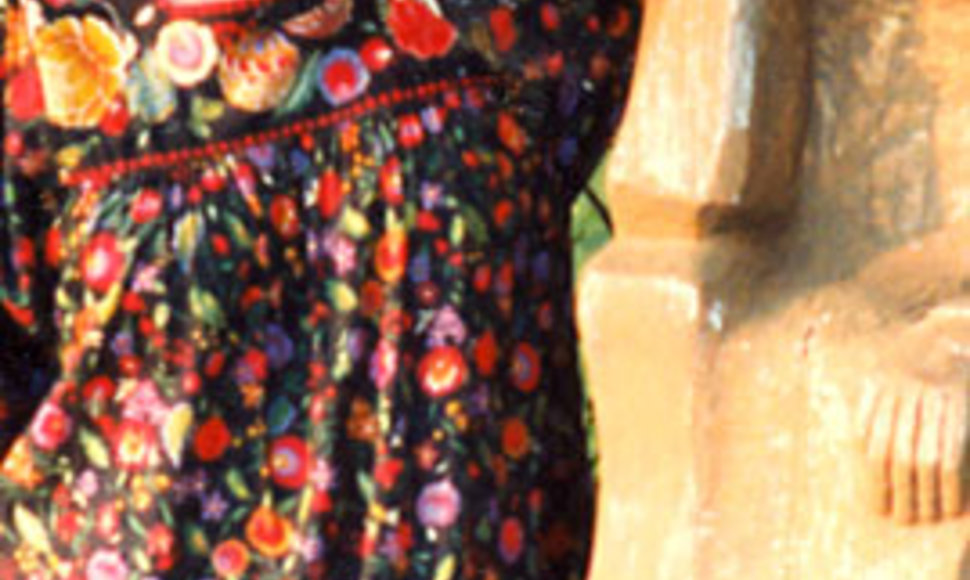The book alternates between the story of Markelis's youth – especially her struggle for cultural identity – and a series of touching later scenes with her octogenarian mother.
We see Daiva and her sister begging for real American Halloween costumes and a plastic Christmas tree, while the parents insist on speaking Lithuanian and holding true to their traditions. The descriptions of Catholic school, Lithuanian scout camp, and the family resort owned by Valdas Adamkus (who later returned to Lithuania and became its president) are tart and funny.
Markelis reveals a culture as well as a personal history. She writes affectionately about the streets, the buildings, even the tackiest billboards of her home town - while, at the same time, not shrinking from frank portrayals of racial tension and alcohol abuse. The portraits of her parents are filled with a lovely tenderness, even as she pokes fun and reveals some of their failings.
This tale of seeking cultural identity within an immigrant community comes to an uplifting conclusion. By the end of the book, Markelis has discovered her own way to be both Lithuanian and American.
- Daiva, the title of your book comes from a riddle that your father posed to you when you were a child: "Black sheep on a white field / He who knows them, leads them." The answer is "letters on a page." You are truly a "shepherd of words" – an eloquent, elegant writer. Your love of both languages shines throughout your memoir.
- Thanks for the kind words, Ellen. I'm going to start listing "shepherd" as my occupation!
I've always thought being bilingual is an advantage in so many ways. Growing up in a heavily Lithuanian culture and speaking Lithuanian as my first language have given me a different lens through which to observe American life. This has enriched me as a writer and as a human being.
My parents encouraged reading, both in Lithuanian and in English, and that has probably had the biggest impact in my wanting to be a writer and a teacher of literature.
- A particularly touching part of the book, for me, was the brief section called "The Alphabet of Silence." You describe how, near the end of your mother's life, she presented you with a set of silverware that had been given to her family for safekeeping by a Jewish doctor, who then perished in the Holocaust.
You challenge your mother, asking why the fate of Lithuania's Jews was not mentioned in the community when you were growing up. On the verge of tears, she asks you to reassure her that she was a good mother.
Your handling of this scene is so subtle and beautiful that I'm reluctant to ask you to say more. But can you? Is such a conversation between mother and daughter a common one in Lithuanian-American homes?
- I'm so glad you liked this section, Ellen. I wanted to write more about the many silences I experienced growing up in a Lithuanian household, but I wasn't sure how to go about this. I didn't want to alienate Lithuanian readers, many of whom are still reluctant to discuss what happened during the Nazi occupation of Lithuania. In retrospect I think I was being too subtle.
I was very close to my mother. We had many interesting conversations about a variety of topics – religion, politics, even sex. I think many Lithuanian-American daughters are close to their mothers – sometimes I think our mothers felt a bit lonely and misunderstood, and thus turned to their daughters for companionship. Of course, I thought my mother was special. She was a very outspoken, funny, and intelligent woman.
- How has the book been received within the Lithuanian-American community? How do you respond to people who worry that you've shown too much dirty Lithuanian-American laundry in public?
- I've received many letters, emails, and phone calls from Lithuanian-Americans saying how much they loved the book. I really wasn't expecting that! The most positive responses have come from individuals my age who grew up in Chicago or Cicero, thanking me for writing a memoir that chronicles experiences they've gone through with parental expectations, Lithuanian Saturday School, and even drinking at the bars on 69th Street in Marquette Park.
Lithuanian-Americans from an earlier generation - those whose grandparents immigrated to this country at the turn of the last century - also seem to like the book. Friends tell me that some Lithuanians are angry that I emphasize drinking so much. But I wrote what I observed and lived through, and drinking was a part of that. As I grow older I care less about what people think - I tell my students that a growing indifference to the judgments of others is one of the advantages of aging.
Also, the idea of "dirty laundry" is, to some extent, subjective. I'm sure that some Lithuanians feel I've revealed too much. Yet one friend said that I held myself back too much. And non-Lithuanian friends and critics who've read my book have remarked on how strongly the emphasis on education and culture in Lithuanian life comes through.
- Books about the Lithuanian-American experience are few and far between. Why do you think this is?
- There aren't that many of us out there, at least compared to the Poles, who've written much more widely about their experiences as immigrants and children of immigrants. Also, Lithuanian-Americans of my parents' generation encouraged their children to go into practical fields such as engineering and nursing. Perhaps surprisingly – because there are fewer of them – Lithuanian-Canadians have led the literary way. Antanas Šileika's first novel, Buying on Time, is a wonderful and very funny book about growing up Lithuanian-Canadian. And Irene Guilford's The Embrace examines the complex relationships between Lithuanians in the homeland and the diaspora. Both authors have influenced my own writing.












